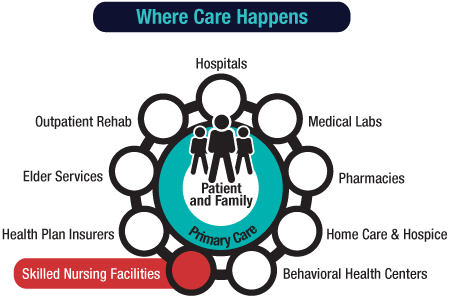
What Are Skilled Nursing Facilities?
Skilled nursing facilities offer a combination of medical care, personal assistance, and rehabilitation services under the supervision of licensed professionals. Patients may stay for a short-term rehabilitation period after surgery or illness, or they may become long-term residents if they are no longer able to live independently or safely at home.
These facilities are designed to meet both the physical and emotional needs of individuals, often serving older adults or those living with chronic conditions, disabilities, or cognitive impairments such as dementia. As hospital stays continue to grow shorter, skilled nursing facilities play an increasingly important role in the care continuum.
What Is It Like to Work in a Skilled Nursing Facility?
Working in a skilled nursing facility can be deeply rewarding for those who are compassionate, dependable, and eager to form meaningful connections with patients. Care is focused not only on treating medical conditions but also on preserving dignity, independence, and quality of life.
Skilled nursing facilities operate 24 hours a day, 7 days a week, which means healthcare professionals often work in rotating shifts, including nights, weekends, and holidays. Direct care roles can be physically demanding, requiring lifting, repositioning patients, and responding to a range of needs throughout the day. However, these roles offer a unique opportunity to provide long-term, person-centered care.
Career Opportunities in Skilled Nursing Facilities
There are a variety of career paths available in skilled nursing facilities, from direct patient care to rehabilitation, nutrition, and administrative support. Whether you’re starting your career or advancing into a specialized field, SNFs offer hands-on experience in a team-based setting.
Career roles may include:
- Certified Nursing Assistants (CNAs):
Provide personal care such as bathing, feeding, and mobility assistance. CNAs are often the primary caregivers in day-to-day patient interactions. - Licensed Practical Nurses (LPNs):
Deliver basic medical care, administer medications, and support RNs and physicians with routine procedures. - Registered Nurses (RNs):
Assess patient needs, coordinate treatment plans, and oversee the care team to ensure high-quality care is delivered. - Nurse Practitioners:
Offer advanced nursing care, diagnose conditions, and prescribe medications. Often serve as primary care providers within the facility. - Occupational Therapists:
Help patients regain or maintain independence in daily living activities such as dressing, eating, and grooming. - Physical Therapists:
Support patients in recovering physical strength, balance, and mobility following illness, surgery, or injury. - Dietary Aides and Nutritionists:
Plan and deliver meals tailored to individual dietary needs, supporting overall health and recovery. - Social Workers and Activity Coordinators:
Address the emotional and social needs of residents, helping to create a sense of community and engagement.
Why Consider a Career in Skilled Nursing?
If you are passionate about healthcare and enjoy building long-term relationships with the people you serve, skilled nursing may be a great fit. This field values empathy, patience, and teamwork—and provides a stable, growing career path with opportunities to make a lasting difference in someone’s life.
Whether you’re exploring a first step into healthcare or advancing to a leadership role, skilled nursing facilities offer a meaningful environment to grow your career.
 Healthcare Workforce Partnership
Healthcare Workforce Partnership  REB - REGIONAL EMPLOYMENT BOARD OF HAMPDEN COUNTRY, INC.
REB - REGIONAL EMPLOYMENT BOARD OF HAMPDEN COUNTRY, INC.